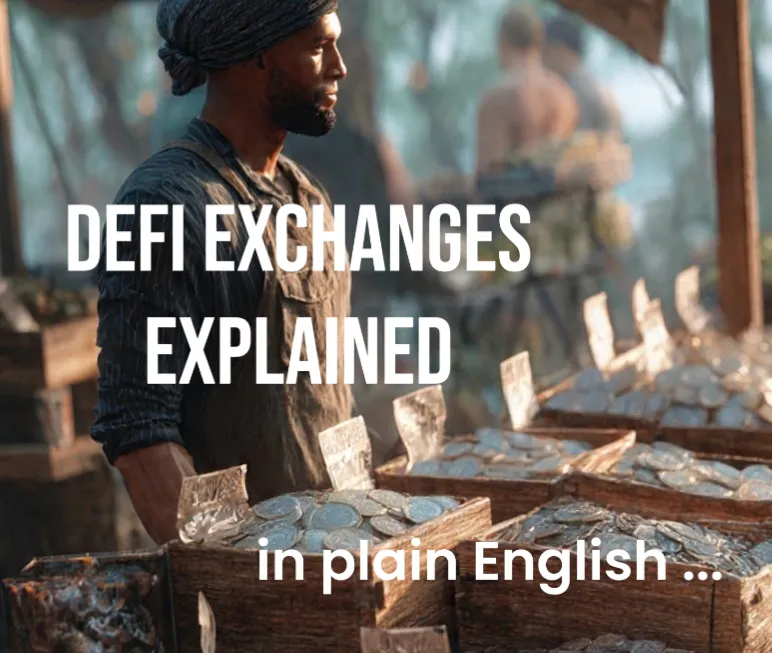
Why DeFi?
What the Heck Is DeFi—and Why It Matters
Let’s start with the basics. DeFi stands for Decentralized Finance, which sounds like something cooked up by a Silicon Valley startup after too much kombucha. But don’t let the buzzwords fool you—DeFi is one of the most important financial shifts happening today, and if you’re over 40 and still think “staking” is something you do to a tomato plant, it’s time we had a chat.
The Old Way: Banks, Brokers, and Bottlenecks
For most of our lives, finance has been centralized. You want a loan? You go to a bank. You want to trade stocks? You call a broker. You want to send money overseas? You pay a fee, wait five days, and hope it doesn’t get lost in the digital Bermuda Triangle.
These institutions act as middlemen. They hold your money, approve your transactions, and take a cut every time you blink. And while they’ve served a purpose, they’ve also created friction, fees, and—let’s be honest—a whole lot of frustration.
Enter DeFi: Finance Without the Middlemen
DeFi flips that model on its head. Instead of relying on banks or brokers, DeFi uses blockchain technology and smart contracts to let people interact directly with financial services. You can lend, borrow, trade, earn interest, and even insure assets—all without asking permission from a guy in a tie.
Think of DeFi as a vending machine for money. You put in your crypto, press a button, and out comes a loan, a trade, or a yield. No banker. No paperwork. No waiting for business hours.
How Did This Happen?
It all started with Bitcoin in 2009—a digital currency that didn’t need a central bank. Then came Ethereum in 2015, which introduced smart contracts: self-executing code that could automate financial agreements. That was the spark.
Developers realized they could build entire financial systems on top of Ethereum. Lending platforms like Aave. Trading protocols like Uniswap. Stablecoins like DAI that mimic the dollar. Suddenly, anyone with an internet connection and a crypto wallet could access financial tools once reserved for Wall Street.
Why Is DeFi Growing?
Three reasons:
Access: DeFi is open to anyone. No credit checks. No minimum balances. If you’ve got a smartphone and a crypto wallet, you’re in.
Transparency: Every transaction is recorded on the blockchain. You can audit the code, track the money, and see exactly what’s happening. Try doing that with your bank.
Yield: Traditional savings accounts pay peanuts. DeFi protocols offer real returns—sometimes double digits—through lending, staking, and liquidity pools. Of course, with higher returns come higher risks, but at least you’re not stuck earning 0.01% while inflation eats your lunch.
But Is It Safe?
Let’s be honest: DeFi isn’t all sunshine and rainbows. There are scams, bugs, and rug pulls (that’s crypto-speak for “they took the money and ran”). It’s a bit like the Wild West—exciting, but you’d better know how to ride before you saddle up.
That’s why education matters. You don’t need to become a coder or a trader, but you do need to understand the basics. What’s a smart contract? What’s a liquidity pool? How do you protect your wallet? These are the new rules of the financial game, and if you don’t learn them, you risk being played. You can learn them at The Crypto Codger College at www.thecryptocodger.com.
What’s Next for DeFi?
DeFi is still young. It’s like the internet in the ’90s—full of potential, but not quite ready for grandma. But the pace of innovation is staggering. We’re seeing:
Tokenized real estate: Buy a fraction of a building.
Decentralized insurance: Pool risk without an insurance company.
Cross-chain finance: Move assets between blockchains like you’re swapping currencies at the airport.
And regulators are starting to pay attention. That’s a good thing. With clearer rules and better protections, DeFi could become a mainstream alternative to traditional finance—faster, cheaper, and more inclusive.
So Why Should You Care?
Because DeFi isn’t just for techies and twenty-somethings. It’s for anyone who wants more control over their money. It’s for retirees looking for better yields. It’s for professionals tired of red tape. It’s for people who believe that financial freedom shouldn’t require a permission slip.
And if you’re reading this, you’re already ahead of the curve.
Final Word from the Codger
I’m not here to hype coins or sell dreams. I’m here to teach. If you want to learn how DeFi works, how to avoid scams, and how to think about Digital Assets in your portfolio, I’ve got classes, resources, and a few war stories to share.
Because old-school grit still matters—even in a new-school world.